The 9 best Final Fantasy games
With Final Fantasy XVI on the way, here are the nine best games in the series so far!
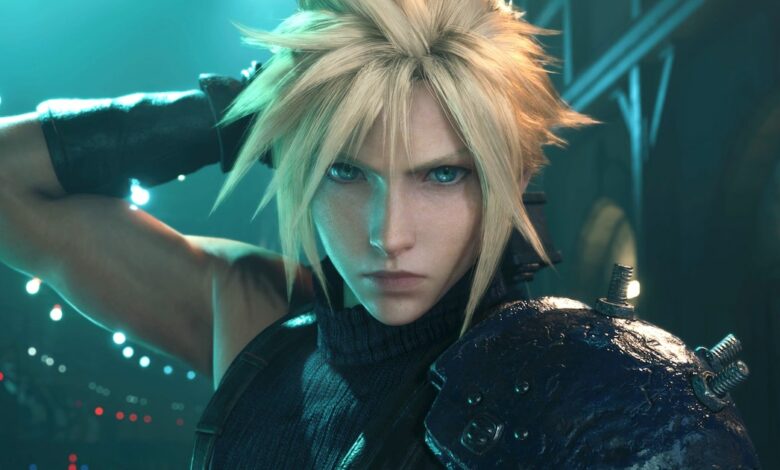
In the year 2023, the word “final” in Final Fantasy means absolutely nothing. To date, there’s been 15 main entries in this Square Enix series — and well over 100 if you count spin-offs and re-releases. With Final Fantasy XVI on the horizon, there’s no better time to discuss the best Final Fantasy games in the series.
With a franchise as widespread and diverse as this, of course, there’s plenty of games to choose from. In addition to the mainline games, there’s been multiple side series and standalone sequels to main games throughout its history. While not every entry has been received positively by fans, it’s a huge testament to the creative teams involved that the franchise manages to stay fresh and innovative.
We’ve pulled out nine of our favorite Final Fantasy games below, ordered by release date. We pulled from various parts of the series’ history, from its humble RPG beginnings to its action-heavier modern counterparts and everything in between. It’s likely that we’ll overlook several acclaimed and beloved entries, of course, but we wanted to focus on the most impactful and important games in the lineup.
So let’s talk about the nine best Final Fantasy games!
9: Final Fantasy IV (1991)
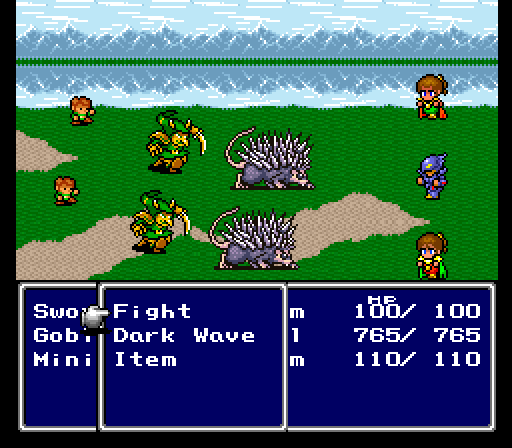
We’re starting this list with the game that introduced a lot of Western fans to the franchise: Final Fantasy IV. (Originally known in the U.S. as Final Fantasy II as it was the second game localized for the West.) As the fourth entry in the series and the first released on the Super Nintendo, it naturally had to evolve the series past the restrictions of the previous games. And it did to to astounding results.
This is where a lot of Final Fantasy tropes made their debut. The Active Time Battle system, famously created by Hiroyuki Ito, first appeared here and revolutionized the way turn-based RPG battles worked. Adding an element of recharging attacks gave encounters a more strategic and real-time feel to them, and arguably paved the way for real-time RPG combat systems going forward.
But what’s probably the most innovative element of Final Fantasy IV is its heavier emphasis on storytelling. Narrative had been an aspect of the first three games, but the fourth title pumped it up considerably with more depth in its characters and situations. The tale of dark knight Cecil Harvey and his rebellion against the mad sorcerer Golbez and his master Zemus is filled with emotional and moral conflicts. The actions of its characters occupy a far grayer area, with the heroes not always doing the right thing.
In hindsight, it’s all relatively simple compared to the rest of the franchise. But Final Fantasy IV laid the groundwork for the series going forward, and its impact feels all the greater nowadays.
8: Final Fantasy VI (1994)
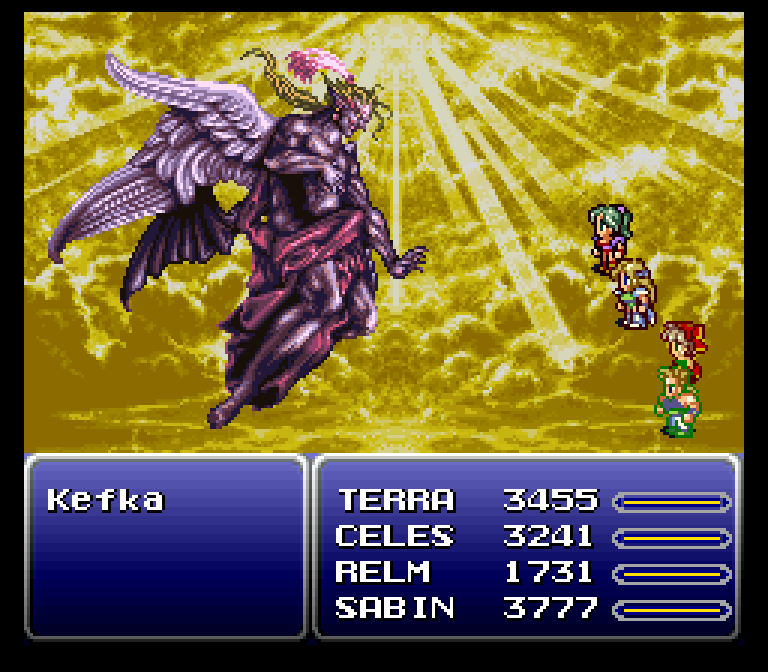
Widely considered one of the greatest RPGs of all time, no list of the best Final Fantasy games would be complete without Final Fantasy VI. (Originally known as Final Fantasy III in the U.S. for the same reasons as above.) The last Final Fantasy game on the Super Nintendo, this title reflects a significant maturation point in the series, both in gameplay and tone.
Up until this point, the series was strictly a swords-and-sorcery kind of fantasy game. To some degree, Final Fantasy VI is as well, but it seems significantly more modern and futuristic with influences from steampunk to 18th and 19th-century architecture. The Magitek machines, an iconic image of this game, encapsulate this the best: a merging of magic and technology that feels so foreign in its construction.
With the largest playable party in the series to date, it’s no wonder why the characters struck such a chord with players. Terra and her hidden lineage, Locke and his tragic past, Celes and her kind soul, Cyan and his quest for vengeance, Setzer and his gambling habits — the list goes on. An ensemble cast as stacked as this might seem overbearing, but the writers and character designers took great care to make every character unique. With one of the most memorable villains in the entire series in the insane jester Kefka Palazzo, it’s a memorable adventure from start to finish.
7: Final Fantasy VII (1997)
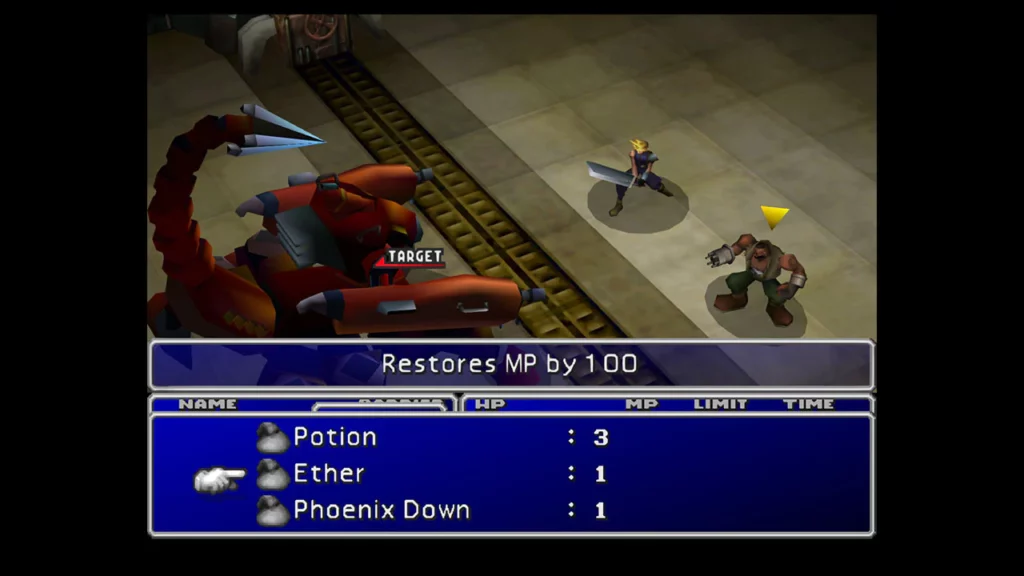
It almost seems passé to include Final Fantasy VII on a list of the top games in the series. You all knew the second you clicked on this article that you’d see this juggernaut of a game on here. But it absolutely deserves all the praise it’s received.
One of the biggest launches of gaming history, the seventh entry represented the deepest shift into science fiction-inspired fantasy yet. If Final Fantasy VI signified a step into urban fantasy and technological influences, VII is a deep dive into it. With a fantastic party and a story involving evil corporations, radical rebels, and the end of the world, it’s also one of the more mature games in the series.
The transition to the PlayStation after years on Nintendo consoles gave Square a means to push the graphical and storytelling boundaries further than what was thought possible. This was one of the earliest examples of a cinematic video game experience, with several full-motion cutscenes depicting story events. The gameplay translated well into 3D, but felt that much more impactful thanks to the dynamic camera angles and animations.
It’s absolutely worthy of its acclaim, and a high water mark for the series for sure. And while it isn’t getting a separate entry, Final Fantasy VII Remake is noteworthy in its own right and should be mentioned.
6: Final Fantasy Tactics (1997)

For years, Final Fantasy helped set the standard for turn-based RPG combat. The next entry on this list continued in a similar vein but followed a new genre: the tactical RPG. 1997’s Final Fantasy Tactics began a whole new sub-series, and those who played it back then still remember how enjoyable its challenge and gameplay are.
The influence of other tactical RPGs like Ogre Battle is apparent. (And fitting, seeing as how Yasumi Matsuno directed both titles.) Yet Tactics stands on its own thanks to its customizability. Implementing the Job system from previous Final Fantasy games was a stroke of genius. It allowed you to change your party’s role to suit a specific scenario, giving you plenty of opportunities for new strategies and maneuvers — an essential part of tactical warfare.
It’s also noteworthy for its setting of Ivalice, one of the few Final Fantasy settings to reappear in other games — even outside of the Tactics series. Taking direct inspiration from medieval fantasy settings, the kingdom of Ivalice has evolved immensely over the years thanks to its multiple appearances. While Tactics is outstanding in its gameplay, the fact that it launched such an iconic landscape is reason enough to put it on this list.
5: Final Fantasy IX (2000)

You could argue that by Final Fantasy VIII, Square had lost sight of what made this series what it is. Maybe it was leaning too hard into science fiction and got away from the “fantasy” aspect. Final Fantasy IX corrected that with a shift back towards the series’ roots as a celebration of the franchise. And it’s absolutely glorious.
By the time this title dropped, the series had been going on for 13 years. With so many games under their belt now, it’s understandable why Square would want to reel things back in a bit. In a world with several warring kingdoms and plenty of lands to explore, you control Zane and his band of thieves as they head off on an adventure to save the realm from destruction. While there are a few new gameplay additions, it’s a remarkably standard affair for the series — which, in all honesty, makes it feel more refreshing.
Final Fantasy series creator Hironobu Sakaguchi has gone on record saying that Final Fantasy IX is his favorite game in the series. We have no reason to argue with him; it’s a wonderfully tight and magical adventure.
4: Final Fantasy X (2001)
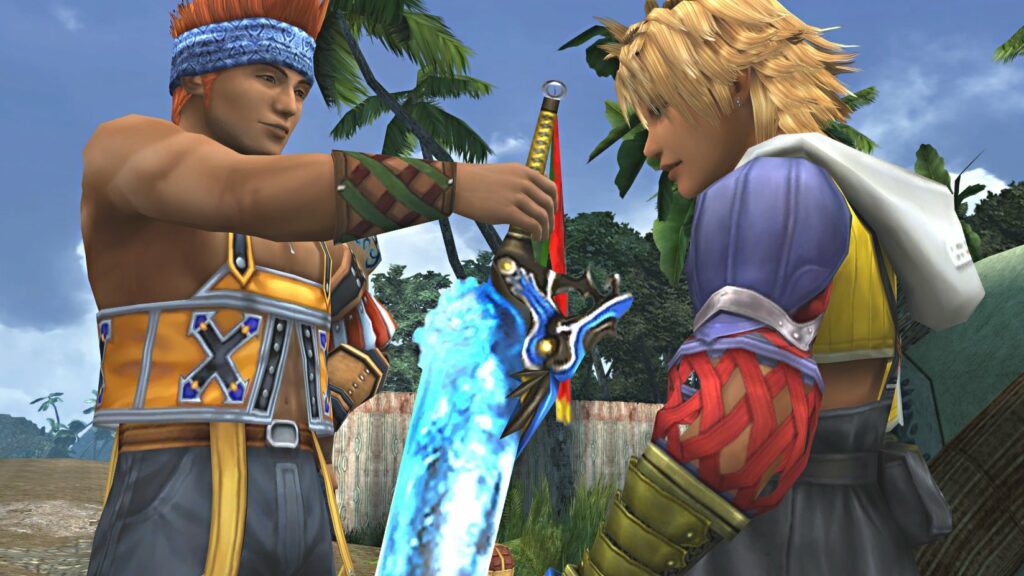
The shift to the PlayStation 2 represented another significant graphical shift for the Final Fantasy series. The tenth main entry was the first to feature a full 3D world with no pre-rendered backgrounds, in addition to full voice acting. And with its island setting and unique gameplay improvements, it set itself apart from a lot of the classic games and found a fanbase of its own.
This game abandoned the Active Time Battle system in favor of the Conditional Turn-Based Battle mechanic. With this, every combatant in the battle takes turns making actions — very similar to a traditional turn-based system, but turn order can be influenced by several different factors. Somehow, it turned what was then seen as a fairly dated idea into a fresh and bold combat system. Combined with the Sphere Grid leveling system, where characters unlock new abilities and upgrades rather than just improving stats, it created more modern yet still classic gameplay.
What stands out most to us about Final Fantasy X is its tropical setting, inspired by islands in the South Pacific. The artists took advantage of the PS2 hardware to render the world of Spira beautifully. Thanks to its graphical prowess, the characters and environments look great for the time. It’s a wonderful world for a wonderful little game.
(And of course, Final Fantasy X has blitzball. It has to make this list for blitzball.)
3: Crisis Core: Final Fantasy VII (2007)
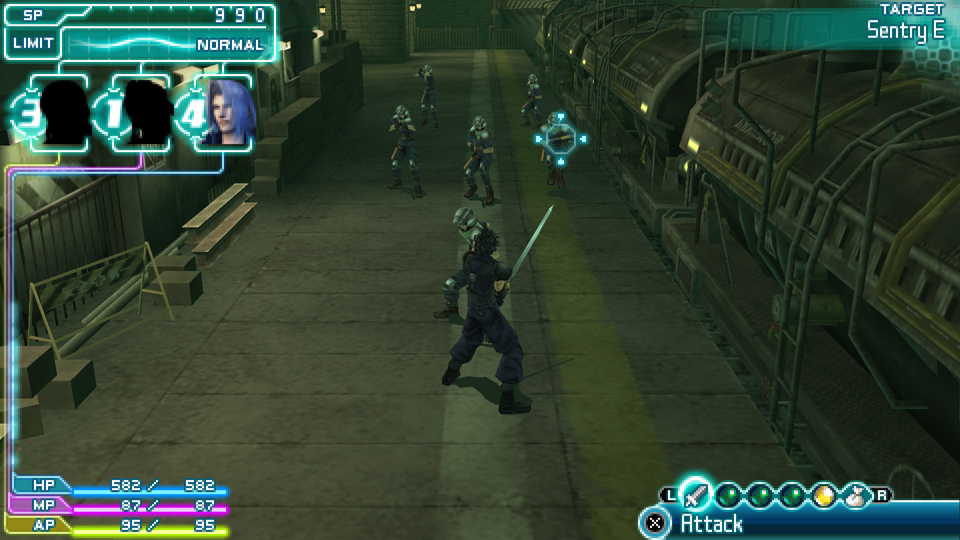
On one hand, it’s easy to dismiss how much Square has milked Final Fantasy VII for all its worth and more. While it’s understandable why the company would want to follow up on undoubtedly the most popular game in the series, the Compilation of Final Fantasy VII series doesn’t always live up to the legacy of the original. But Crisis Core: Final Fantasy VII is a major exception.
Exploring the backstory of Zack Fair was a perfect move, considering how integral it is to the story of Final Fantasy VII. You don’t necessarily learn too much more about Cloud and Sephiroth that you couldn’t gather from the original, but it still serves as a great prequel to the main story.
But what makes this title rise above the other spinoffs is its excellent gameplay. The main series already transitioned into real-time action-RPG gameplay with Final Fantasy XI and XII, and Crisis Core follows suit with fast-paced action and plenty of moves to pull off. There’s a heightened element of luck thanks to the Digital Mind Wave slot machine providing random buffs and Limit Breaks, but it works really well.
Whether you play the original PSP version or the recent remaster Crisis Core: Final Fantasy VII Reunion, this is a top-tier spinoff that shouldn’t be ignored.
2: Dissidia Final Fantasy (2008)
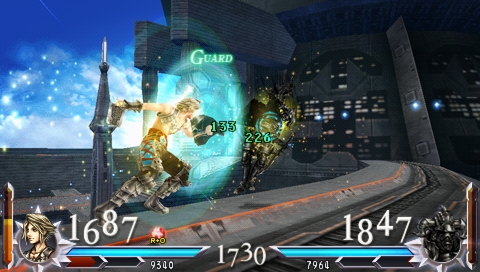
With a large series like Final Fantasy, the franchise cast is bound to become enormous. That begs the question: what would happen if the characters from one game met the characters of another? Dissidia Final Fantasy brings in heroes and villains from the first ten games and does the only thing imaginable: force them to fight each other.
A Final Fantasy fighting game just sounds like something you wonder why they hadn’t done before. Gathering the most popular characters from the main series and pitting them against each other with real-time combat in 3D arenas works incredibly well. You can equip your character with a customizable item set, and gain experience points just like a traditional Final Fantasy game.
However, it also takes inspiration from traditional fighting games with special attacks mapped to the EX Gauge that can turn the tide of battle. It’s a mechanically fun game, but it’s also a perfect celebration of the series’ heroes and villains up to that point. Dissidia Final Fantasy spawned its own sub-series that expanded the fighting mechanics and added characters from future games, all of which continue the awesome gameplay and intense action in marvelous ways.
1: Final Fantasy XIV (2013)
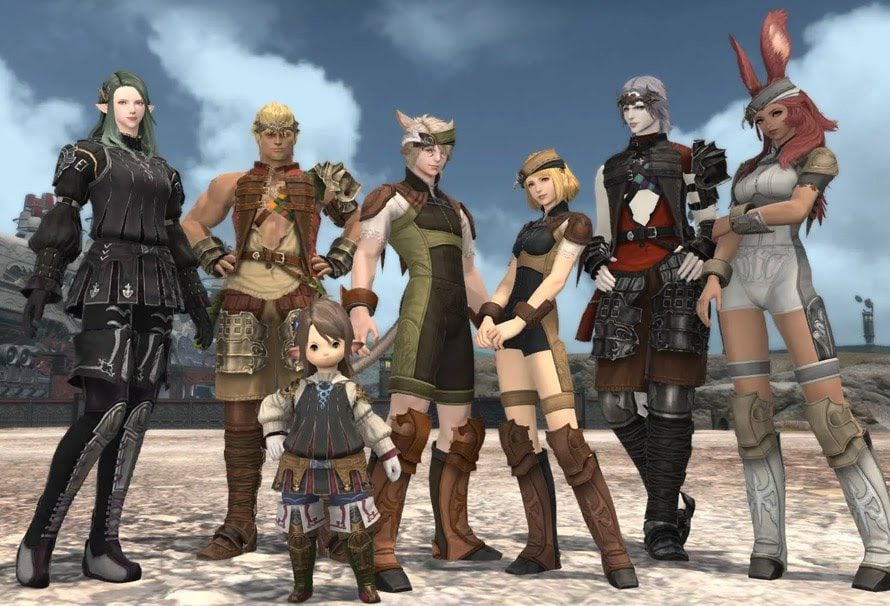
It was only a matter of time before Final Fantasy received an MMO title. Final Fantasy XI broke new boundaries by being the first online mainline title all the way back in 2002, and that title is still available to play today. (On PC, anyway.) But Square is also continuously updating another Final Fantasy MMO with Final Fantasy XIV.
For the record, we’re talking about the second version of Final Fantasy XIV, originally subtitled A Realm Reborn. The original launch of this game in 2010 was infamously terrible, with fans deriding its unfinished gameplay and mechanics. To its credit, Square went back to the drawing board and relaunched Final Fantasy XIV in 2013 to acclaim from both critics and fans. It’s still getting new content to this day, with multiple expansion packs and updates coming after launch.
With a large world to explore, a dedicated playerbase, and immersive character customization options, the game has so much content for you to dive into right now. Given how poorly received the original release was, it would have been incredibly easy for Square to just let it die and move onward. The fact that they stuck to their guns and gave us a complete version of Final Fantasy XIV shows a dedication to the game that’s become one of the most beloved in the entire franchise.
The saga continues with Final Fantasy XVI
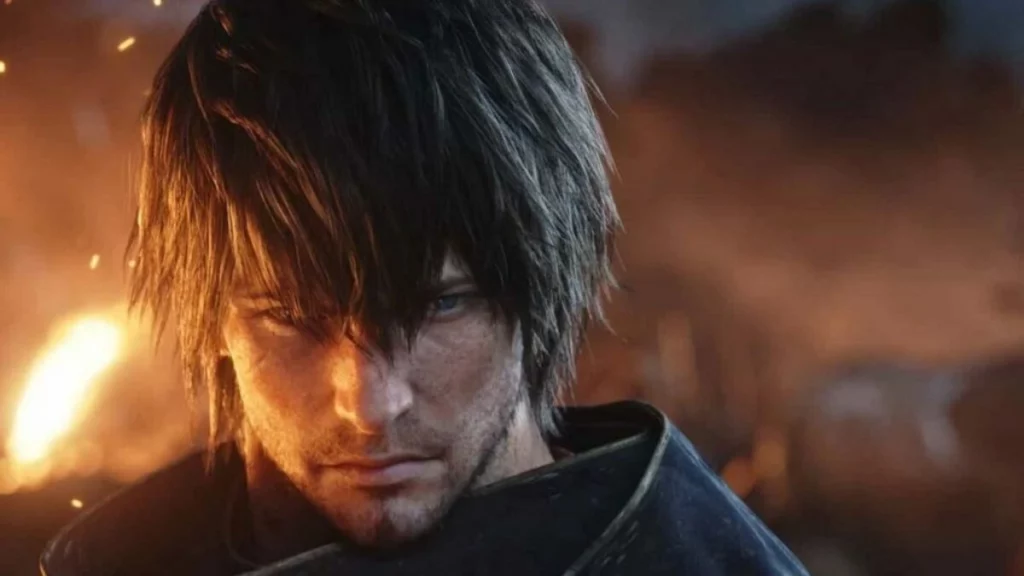
While we’ve looked back on nine classic titles in this legendary series, it’s also a perfect time to look forward. Final Fantasy XVI, the next chapter in this epic saga, launches on June 22, 2023 exclusively for the PlayStation 5. From the gameplay and story trailers, it looks like another suitably grand entry that will hopefully leave fans satisfied.
We’ve only scratched the surface with this list, and no doubt we’ve left out some of your favorite titles. What are your favorite Final Fantasy games? Let us know!

